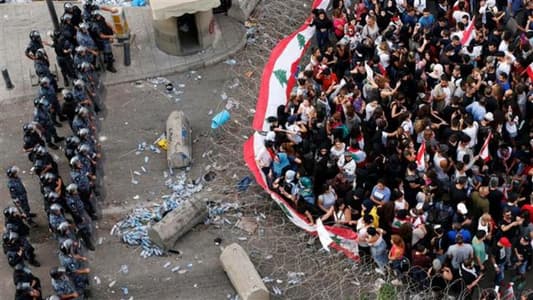A new and hopeful protest movement is sweeping over Lebanon, with thousands of people standing against the country's political elite. What began as protests over the past week against austerity and government plans to expand its regressive tax measures has now grown into a movement against the corrupt ruling class.
The prime minister's recently announced economic plan has done little to subdue the rage on the country's streets. The measures are too little, too late, as the government has lost the trust and confidence of the people.
The only surprising thing about the anger across the streets of Lebanon is that it did not erupt earlier. For years, a rage has been brewing against the country's inept, corrupt and distant political elite. We saw it in 2015 during the "You Stink" protests over the failure to manage Beirut's sanitation. In recent weeks, this anger rose once again over the sudden shortage of dollars - raising fears over the supplies of medicine, wheat and fuel - and burst into full view when the Chouf forests caught fire. The final indignity was the ham-fisted imposition of a tax on WhatsApp calls.
Ever since the end of the civil war, the ruling elite has sought to create a system for its own gain - one that created some new infrastructure but brought little investment. Downtown Beirut, where tens of thousands have gathered over recent days, was built as a monument to their political and economic greed. Manufacturing has been neglected, and fallen into decline. Public services, such as electricity, clean water and health care, were all but abandoned. The electricity dutifully goes out for three hours a day, but it is only those who cannot afford generators who are impacted.
As economists have noted, the top 1 per cent now controls a quarter of all national income while the poorest half of the country owns just a tenth. One in four Lebanese people are unemployed, including one in three young people. Debt is at 150 per cent of GDP, the third highest rate in the world.
The problem, as the protestors have been saying, isn't any single policy or politician. It is the entire political class. Regardless of which sect or party or part of the country they come from, authorities turn to public funds to deepen their own pockets and disperse favours to their followers in return for their support. If someone wants a government job, they must go and seek the intercession of their sectarian political leader. For a long time, sectarian fault lines have diverted attention away from how much the ruling elite shares and how little they have left for the rest of the country.
But by far the most unprecedented and powerful shift to come out of this movement is the solidarity shown across sects and classes. Hearing sunni communities in the North chanting in support of shi'a communities in the South felt powerful for someone like myself growing up with sectarianism discourse. This leaderless popular movement is not being led by the wealthy capital of Beirut, as per previous waves of protests, but is equally spearheaded in the country's poorest areas in the North and South. Communities are no longer afraid to criticise their own political and religious leaders. This unified rejection of the ruling class poses the biggest threat to leaders yet. Political leaders can no longer use the myth of sectarian strife to crush dissent from their constituencies. The dissent has hit all political elites in equal measure.
Instead of the propagandist songs of political parties, it is now the national anthem that is being sung by young and old in the streets. It is not the flags of political parties amongst the crowds but the national flag that is now patriotically donned by the public. The posters of political leaders are not being plastered across buildings but rather being torn down by their constituents, from Prime Minister Saad Hariri to Parliamentary Speaker Nabih Berri. When thugs were unleashed to attack protesters in the North and South, the public fearlessly took to the streets in large numbers.
No political leader has been spared. The Christian Maronite leader of the Lebanese Forces, Samir Geagea, won no applause for leaving the government. Walid Jumblatt, the leader of the Druze community, was criticised for going back on his own commitment to resign. Protesters have even criticised Hassan Nasrallah of the shi'a party Hezbollah with the chant: "All means all, and Nasrallah is one of them."
The only reason why people tune into watch Saad Hariri's speeches is with the hope of hearing him resign. The most abuse is reserved for Gebran Bassil, the foreign minister and son-in-law of the current president, Michel Aoun. The curses hurled at him can't be repeated here but can be heard as far away as Paris, London and Sydney, through the mouths of the equally enraged Lebanese diaspora.
The anger is a sign that the Lebanese have shed their fear. Just before the protests, criticising a policy or a public figure could trigger reprisals from the government. Hundreds of activists and journalists have been subjected to these humiliations - denied their right to freedom of expression, threatened with prison time and left to seethe in silence.
One of the most popular figures to emerge from these days of protests is a woman who fearlessly kicked a minister's weapon-wielding bodyguard where it would hurt him the most. This has now become a metaphor for the spirit of the protest movement and the calls for change.
What is abundantly clear across the country is that a new political order is needed and the existing political elite cannot deliver it. The people on Lebanon's streets will not be placated by pledges of piecemeal reforms. They are determined to kick down the venal order and enthrone economic and social justice in its place.






TWEET YOUR COMMENT